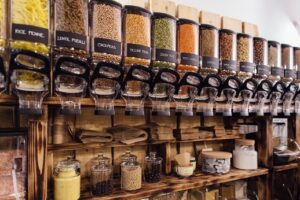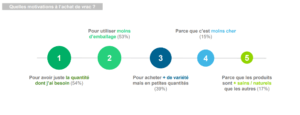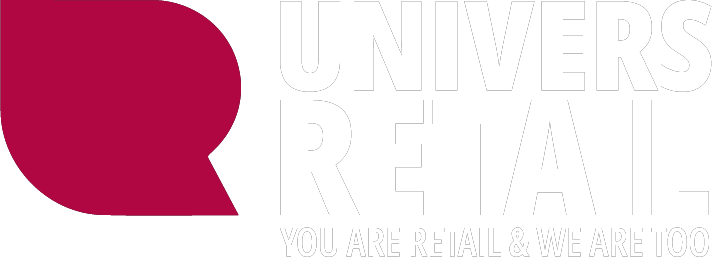[vc_row][vc_column][vc_column_text]
What is bulk packaging?
Following the implementation of the AGEC (anti-waste for a circular economy) and Climat et Résilience laws, inviting companies and individuals to "transform our lifestyles in order to move towards a more sustainable model of society ", a trend has emerged in French habits: buying products in bulk.
Bulk sales consist of "selling consumer products without packaging, in quantities chosen by the consumer, in reusable or reusable containers".
With dedicated areas, a wide range of packaging (jars, boxes, etc.) and a more or less extensive assortment, bulk sales are no longer the exclusive preserve of organic stores. Major supermarket chains such as Carrefour, Leclerc and Intermarché are now offering over-the-counter products to their customers.

A booming consumer trend
A study carried out by BFMTV in December 2022 revealed that 63% of French people consume in bulk. The market alone will represent 1.3 billion in sales by 2021.

(Source: https: //reseauvracetreemploi.org)
Health and climate emergencies are just some of the reasons that are prompting a large number of consumers to change their purchasing habits. The promotion of local shops, the reduction in the use of plastic and the purchase of organic products have all contributed to the success of bulk sales.[/vc_column_text][/vc_column][/vc_row][vc_row][vc_column width="1/4″][/vc_column][vc_column width="1/2″][vc_single_image image="18555″ img_size="full"][vc_column_text](Source: https://reseauvracetreemploi.org)[/vc_column_text][/vc_column][vc_column width="1/4″][/vc_column][/vc_row][vc_row][vc_column][vc_column_text]
This type of sale took root in this context, first establishing itself in organic boutiques and, thanks to its success, expanding into supermarkets.
The most successful products are dry goods (pasta, flour, spices, rice, cereals, cookies, sugar). Initiatives are underway to open up this sales mode to other types of products (cosmetic cleaning products and petcare products). Movements such as "clean beauty", aimed at promoting cosmetics that have not been tested on animals, have democratized this sales method.
A "niche" mode of consumption, it is becoming increasingly democratic. Indeed, one of the major objectives of the AGEC law is to reduce single-use plastic packaging by 20% by the end of 2025.
So how do you democratize this type of purchase?
A major challenge to make its mark on the French way of life
There are several issues surrounding bulk purchasing. The first is accessibility.
A study carried out by Kantar in 2019 defined the majority consumer profile who buy products in bulk: "[...] executives who live in urban areas and households consisting of one person under the age of 35 ". Indeed, bulk is still considered expensive and, consequently, anecdotal.
The magazine 60 millions de consommateurs in its article " Prix des produits en vrac : stop aux idées reçues " points out that "conventional products are more expensive in bulk". According to a Nielsen study carried out in 2019, price is the primary reluctance to consume bulk for the panel surveyed (26%).
Secondly, stock management is also a major issue. In-store purchasing decisions are influenced, among other things, by the assortment on offer. In her book Achat prédéterminé vs achat déterminé : Quel impact sur le processus de décision d'achat, author Chantal Connan Ghesquière points out that "recent research shows that the attractiveness of the assortment is based on three points: the number of references offered in the store, the level of space allocated to the category and the conviction of the availability of the preferred item (...)".
Inventory management means having the right products in the right place at the right time. How do you quantify bulk products? How can we identify them for better stock management? How can we offer an assortment that is as close as possible to consumer demand?
The WRAC and OSLO point-of-sale software publishers offer retailers tools for managing stocks of products sold in bulk. These innovative solutions meet a growing and fundamental need in the retail sector.
In addition to inventory management, hygiene is a fundamental issue. Following the global health crisis in 2020, hygiene and traceability rules for containers and products have been tightened. The latter must be regularly cleaned, and allergens and ingredients must be visible in the absence of the packaging that usually guarantees this type of information.
It is therefore imperative for retailers to maintain impeccable hygiene to avoid the proliferation of pests such as the food moth and the consequences of frequent contact.
[/vc_column_text][/vc_column][/vc_row][vc_row css=”.vc_custom_1696922486673{padding-top: 20px !important;padding-right: 15px !important;padding-bottom: 20px !important;padding-left: 15px !important;}”][vc_column css=”.vc_custom_1696922496950{background-color: #efefef !important;}”][vc_column_text]
CONCLUSION
Bulk is an opportunity for retailers to explore. In a world where ecological and environmental issues are at the heart of the debate in all industries, promoting this mode of consumption makes it possible to :
- Reducing the use of plastic.
- The fight against food waste.
- Promoting local businesses.
Stock management, hygiene and the accessibility of this type of purchase remain areas for improvement if bulk is to be democratized. Let's hope that, in a few years' time, the associated advantages will make bulk buying the predominant form of purchasing!
[/vc_column_text][/vc_column][/vc_row][vc_row][vc_column][vc_column_text]
By Cira Diagana
Sources :
Reseauvrac.org : Dynamiques, pratiques et impacts des professionnels du vrac
Ecologie.gouv : AGEC, climat et résilience
BFMTV : Inflation: l’achat en vrac permet-il de faire des économies ?
60 millions mag : Prix des produits en vrac : stop aux idées reçues
LSA-conso : Ouvrir un drive alimentaire de vrac, un investissement accessible mais risqué
[/vc_column_text][/vc_column][/vc_row][vc_row full_width=”stretch_row” css=”.vc_custom_1696923204611{background-color: #484848 !important;}”][vc_column][vc_row_inner equal_height=”yes” content_placement=”middle” css=”.vc_custom_1696239671567{margin-top: 20px !important;margin-bottom: 30px !important;}”][vc_column_inner width=”1/4″][/vc_column_inner][vc_column_inner width=”1/2″][vc_custom_heading text=”Vous cherchez des experts du retail ?” font_container=”tag:h4|font_size:20px|text_align:left|color:%23ffffff|line_height:22px” google_fonts=”font_family:Exo%202%3A100%2C100italic%2C200%2C200italic%2C300%2C300italic%2Cregular%2Citalic%2C500%2C500italic%2C600%2C600italic%2C700%2C700italic%2C800%2C800italic%2C900%2C900italic|font_style:800%20bold%20regular%3A800%3Anormal”][/vc_column_inner][vc_column_inner width=”1/4″ css=”.vc_custom_1696923134622{margin-bottom: 5px !important;}”][lea_button_style title=”Contactez-nous” align=”right” font_color=”#ffffff” button_text_font=”font_family:Exo%202%3A100%2C100italic%2C200%2C200italic%2C300%2C300italic%2Cregular%2Citalic%2C500%2C500italic%2C600%2C600italic%2C700%2C700italic%2C800%2C800italic%2C900%2C900italic|font_style:800%20bold%20regular%3A800%3Anormal” background_hover_color=”#ffffff” font_hover_color=”#d50950″ link=”url:https%3A%2F%2Fwww.universretail.com%2Fcontact%2F|title:Contact” button_font_size=”16px” button_line_height=”20px” button_design_css=”.vc_custom_1696923504079{margin-bottom: 10px !important;padding-top: 10px !important;padding-right: 20px !important;padding-bottom: 10px !important;padding-left: 20px !important;background-color: #d50950 !important;border-radius: 30px !important;}” animation=”fadeInUp”][/vc_column_inner][/vc_row_inner][/vc_column][/vc_row]

